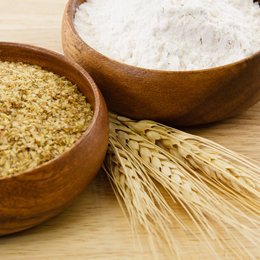
There are some natural pregnancy tips that everyone knows, such as timing intercourse during ovulation to increase your chances of conceiving. But did you know that cutting out gluten might actually help you conceive?
Gluten-free diets, or diets without wheat, are taken on for a variety of reasons. You might have a gluten intolerance and need to cut out the croissants, or maybe you're ditching the donuts as a means of losing weight. The less-heard-of upside to a gluten-free diet is that it may help women get pregnant naturally.
Getting ready for baby benefits
If you have an irritable stomach or gluten intolerance runs in your family, you may want to get tested for the allergy. Gone undetected, it could hinder your chances of getting pregnant. It's also possible that you have a slight sensitivity to gluten, which wouldn't necessarily show up in a lab test. Going on a gluten-free diet can also force you to eat meals rich in fruits and vegetables, which ups your nutrient intake and has the potential to improve your fertility.
But according to the National Institutes of Health, only those who have a gluten intolerance were proven to benefit, fertility wise, from eating a gluten-free diet. However, there are several health benefits to going wheat free, and as far as we know, being healthy never hurt anyone's chances of getting pregnant!
General health benefits
Cutting out wheat, rye and barley is no easy task. If you check your nearest nutritional label, there's a pretty high chance of there being gluten somewhere in the mix, regardless of the product. But the health benefits aren't there because gluten is bad – it's because it's present in a lot of unhealthy foods. French fries, processed foods and beer all have gluten. Very few desserts are gluten-free, and having a donut at breakfast would no longer be an option.
Even though it is very difficult, a gluten-free diet might be the way to go. Wheat is currently grown with the help of a lot of chemicals, and scientists are speculating that the number of people who have a gluten intolerance will grow exponentially in the coming years. The important thing to remember when eating gluten-free is to balance your diet with plenty of protein, fruits, vegetables and carbohydrates. Talk to your physician about what going gluten-free might mean for you.


Leave a Reply